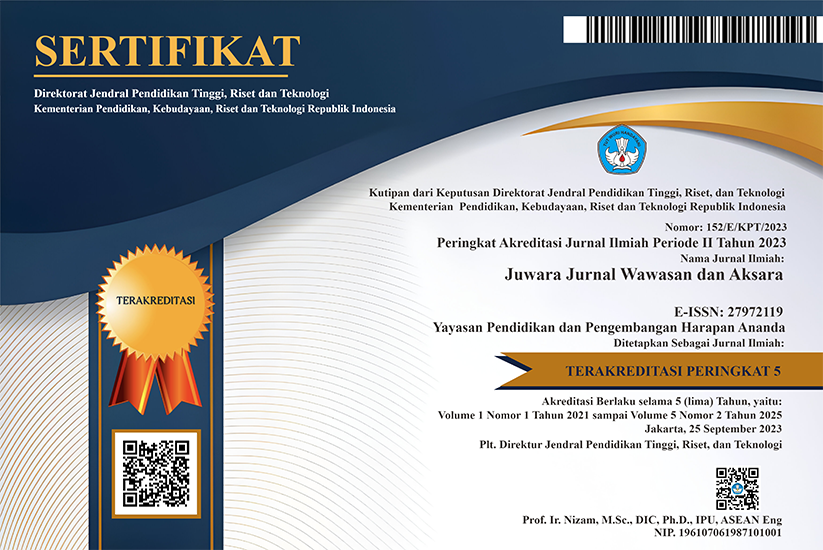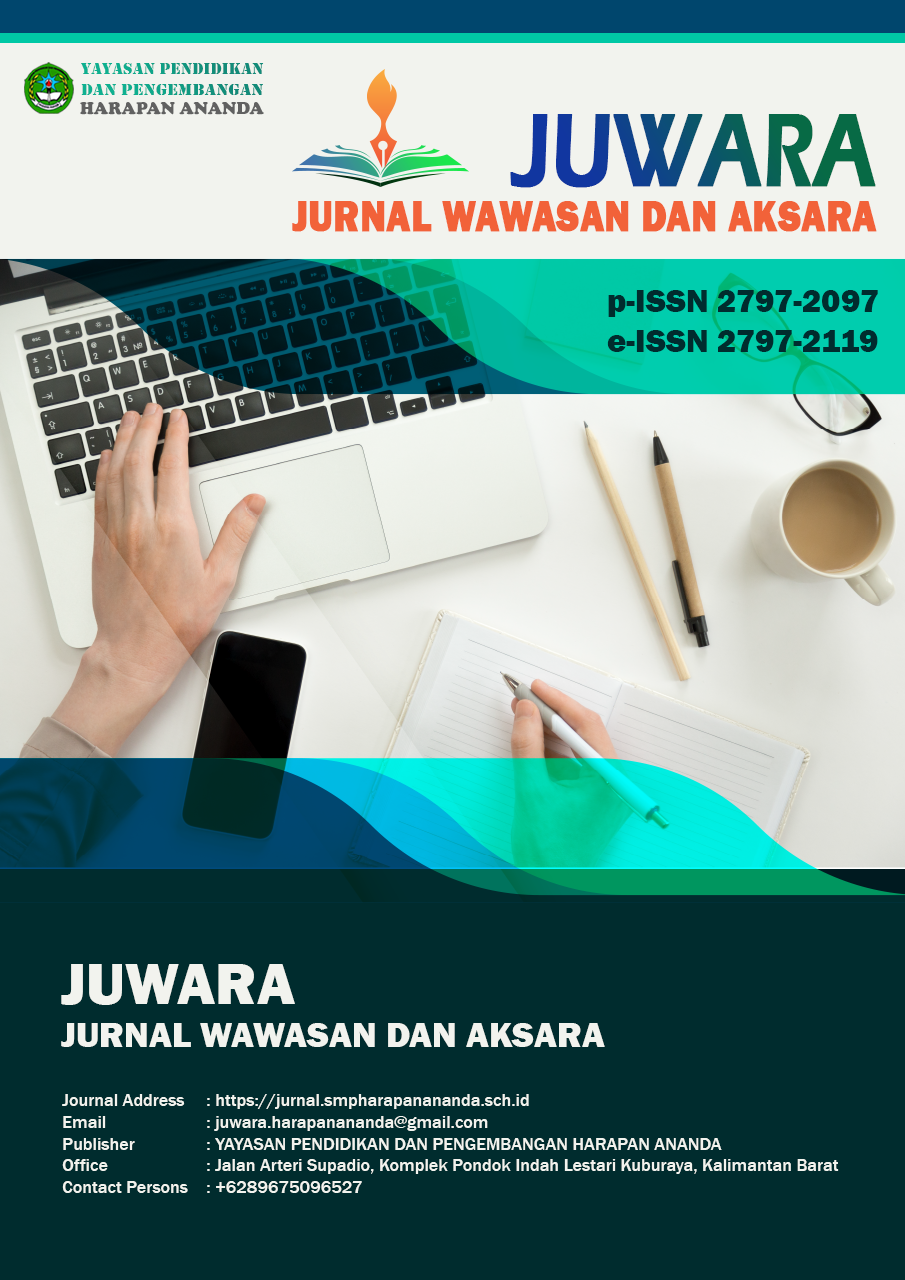Adaptive Inclusion Education Model for Students Mobility Barriers at Karang Jati Elementary School Blora
DOI:
https://doi.org/10.58740/juwara.v5i1.503Keywords:
inclusive education, movement resistance, primary school, special assistant teachers, tunadaksaAbstract
This study aims to explore an adaptive inclusion education model for students with mobility barriers at SD Karang Jati Blora. Using a descriptive qualitative approach, data was collected through classroom observations, in depth interviews with classroom teachers, Special Assistant Teachers, students, and parents, and field documentation. This study found that inclusive learning strategies are applied through assignment modification, flexibility of evaluation methods, and the active role of Special Assistant Teachers as academic and emotional companions. The findings also showed that students' social interaction with movement barriers took place positively in the classroom, supported by a culture of peer empathy and a non-discriminatory approach to teachers. Parents play an important role in supporting children's learning processes, even though they have not been systemically involved in the preparation of learning. The main challenge facing schools is the absence of specialized training, formal documentation systems such as the Individualized Education Plan, on the role of Special Assistant Teachers. The study recommends the need for more affirmative education policies, ongoing training, and strengthening collaboration between stakeholders to ensure the sustainability of adaptive inclusion practices in primary schools.
References
Ball, L., Lieberman, L., Haibach-Beach, P., Perreault, M., & Tirone, K. (2022). Bullying in physical education of children and youth with visual impairments: A systematic review. British Journal of Visual Impairment, 40(3), 513–529. https://doi.org/10.1177/02646196211009927
Bray, A., Devitt, A., Banks, J., Sanchez Fuentes, S., Sandoval, M., Riviou, K., Byrne, D., Flood, M., Reale, J., & Terrenzio, S. (2024). What next for Universal Design for Learning? A systematic literature review of technology in UDL implementations at second level. British Journal of Educational Technology, 55(1), 113–138. https://doi.org/10.1111/bjet.13328
Dignath, C., Rimm-Kaufman, S., van Ewijk, R., & Kunter, M. (2022). Teachers’ Beliefs About Inclusive Education and Insights on What Contributes to Those Beliefs: a Meta-analytical Study. Educational Psychology Review, 34(4), 2609–2660. https://doi.org/10.1007/s10648-022-09695-0
Engelbrecht, P. (2020). Inclusive education: Developments and challenges in South Africa. PROSPECTS, 49(3–4), 219–232. https://doi.org/10.1007/s11125-020-09499-6
Fernández-Batanero, J. M., Montenegro-Rueda, M., Fernández-Cerero, J., & García-Martínez, I. (2022). Assistive technology for the inclusion of students with disabilities: a systematic review. Educational Technology Research and Development, 70(5), 1911–1930. https://doi.org/10.1007/s11423-022-10127-7
Freer, J. R. R. (2023). Students’ attitudes toward disability: a systematic literature review (2012–2019). International Journal of Inclusive Education, 27(5), 652–670. https://doi.org/10.1080/13603116.2020.1866688
Gupta, S., Meershoek, A., & Witte, L. P. de. (2022). Using the Capability Approach to Review the National Legislative Frameworks for Support Services for Persons with Disabilities in Four Countries in Asia. Societies, 12(6), 185. https://doi.org/10.3390/soc12060185
Holmqvist, M., & Lelinge, B. (2021). Teachers’ collaborative professional development for inclusive education. European Journal of Special Needs Education, 36(5), 819–833. https://doi.org/10.1080/08856257.2020.1842974
Hunt, X., Bradshaw, M., Vogel, S. L., Encalada, A. V., Eksteen, S., Schneider, M., Chunga, K., & Swartz, L. (2022). Community Support for Persons with Disabilities in Low- and Middle-Income Countries: A Scoping Review. International Journal of Environmental Research and Public Health, 19(14), 8269. https://doi.org/10.3390/ijerph19148269
Kefallinou, A., Symeonidou, S., & Meijer, C. J. W. (2020). Understanding the value of inclusive education and its implementation: A review of the literature. PROSPECTS, 49(3–4), 135–152. https://doi.org/10.1007/s11125-020-09500-2
Koolen, J., van Oorsouw, W., Verharen, L., & Embregts, P. (2020). Support needs of parents with intellectual disabilities: Systematic review on the perceptions of parents and professionals. Journal of Intellectual Disabilities, 24(4), 559–583. https://doi.org/10.1177/1744629519829965
Lee, J. D., Terol, A. K., Yoon, C. D., & Meadan, H. (2024). Parent-to-parent support among parents of children with autism: A review of the literature. Autism, 28(2), 263–275. https://doi.org/10.1177/13623613221146444
Li, L., & Ruppar, A. (2021). Conceptualizing Teacher Agency for Inclusive Education: A Systematic and International Review. Teacher Education and Special Education: The Journal of the Teacher Education Division of the Council for Exceptional Children, 44(1), 42–59. https://doi.org/10.1177/0888406420926976
Lynch, P., Singal, N., & Francis, G. A. (2024). Educational technology for learners with disabilities in primary school settings in low- and middle-income countries: a systematic literature review. Educational Review, 76(2), 405–431. https://doi.org/10.1080/00131911.2022.2035685
Mendoza, M., & Heymann, J. (2024). Implementation of Inclusive Education: A Systematic Review of Studies of Inclusive Education Interventions in Low- and Lower-Middle-Income Countries. International Journal of Disability, Development and Education, 71(3), 299–316. https://doi.org/10.1080/1034912X.2022.2095359
Miller, A. L., Wilt, C. L., Allcock, H. C., Kurth, J. A., Morningstar, M. E., & Ruppar, A. L. (2022). Teacher agency for inclusive education: an international scoping review. International Journal of Inclusive Education, 26(12), 1159–1177. https://doi.org/10.1080/13603116.2020.1789766
Neca, P., Borges, M. L., & Pinto, P. C. (2022). Teachers with disabilities: a literature review. International Journal of Inclusive Education, 26(12), 1192–1210. https://doi.org/10.1080/13603116.2020.1776779
Nighswander, M. L., & Blair, P. A. (2024). From Institutions to Inclusion: How Children with Disabilities Gained Educational Rights in the U.S. The Journal of School Nursing, 40(1), 108–118. https://doi.org/10.1177/10598405221105054
Nilholm, C. (2021). Research about inclusive education in 2020 – How can we improve our theories in order to change practice? European Journal of Special Needs Education, 36(3), 358–370. https://doi.org/10.1080/08856257.2020.1754547
Nuri, R. P., Batorowicz, B., & Aldersey, H. M. (2020). Family support and family and child-related outcomes among families impacted by disability in low- and middle-income countries: A scoping review. Journal of Child Health Care, 24(4), 637–654. https://doi.org/10.1177/1367493519883456
Paulsrud, D., & Nilholm, C. (2023). Teaching for inclusion – a review of research on the cooperation between regular teachers and special educators in the work with students in need of special support. International Journal of Inclusive Education, 27(4), 541–555. https://doi.org/10.1080/13603116.2020.1846799
Shirazipour, C. H., Evans, M. B., Leo, J., Lithopoulos, A., Martin Ginis, K. A., & Latimer-Cheung, A. E. (2020). Program conditions that foster quality physical activity participation experiences for people with a physical disability: a systematic review. Disability and Rehabilitation, 42(2), 147–155. https://doi.org/10.1080/09638288.2018.1494215
Yu, S., Wang, T., Zhong, T., Qian, Y., & Qi, J. (2022). Barriers and Facilitators of Physical Activity Participation among Children and Adolescents with Intellectual Disabilities: A Scoping Review. Healthcare, 10(2), 233. https://doi.org/10.3390/healthcare10020233
Downloads
Published
How to Cite
Issue
Section
License
Copyright (c) 2025 Nudjedwi Raleg Tiwan

This work is licensed under a Creative Commons Attribution-NonCommercial 4.0 International License.
JUWARA: Jurnal Wawasan dan Aksara provides open access to anyone so that the information and findings in these articles are useful for everyone. This journal's article content can be accessed and downloaded for free, following the creative commons license used.




















